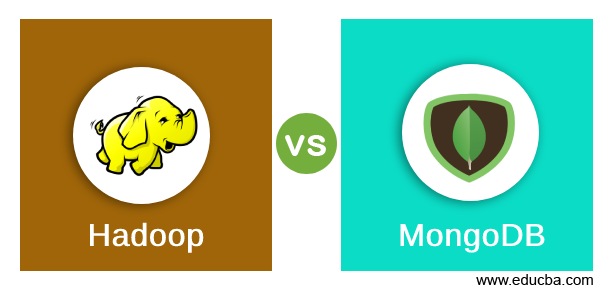Difference Between Hadoop vs MongoDB
Hadoop is an open-source platform that stores and processes massive data. It is a Java-based application that contains a distributed file system, resource management, data processing, and other components for an interface.
The primary purpose of building MongoDB is for data storage and retrieval. It can also perform data processing and scalability. It is based on C++ and belongs to the NoSQL family. It does not rely on creating relational tables. Instead, it stores its records as documents.
Many companies use Hadoop and MongoDB platforms to create their own Big Data application:
- MongoDB uses its platform for real-time operational processes helping end-users and Business processes.
- On the other hand, Hadoop gets the data from MongoDB; blends the data from different sources to produce machine learning models, which MongoDB will use for Real-Time Operational processes.
Head-to-Head Comparison Between Hadoop vs MongoDB
Hadoop and MongoDB are excellent in data partitioning and consistency, but compared to RDBMS, it performs poorly in data availability. Below are the top 9 comparisons between Hadoop vs MongoDB:

Below, we explain the differences between Hadoop and MongoDB:
- Java is the programming language on which Hadoop is based, while MongoDB has been written in C++.
- Hadoop is a Suite of Products, whereas MongoDB is a Stand-Alone Product.
- The hardware cost of Hadoop is more as it is a collection of different software. However, when compared to Hadoop, MongoDB incurs lower hardware costs.
- MongoDB is more flexible than Hadoop and can replace existing RDBMS systems. On the other hand, Hadoop can perform all the tasks but must add additional software.
- MongoDB can use geospatial indexing, which is helpful in geospatial analysis. This feature is not readily available in Hadoop.
- Hadoop is best for Large-Scale processing applications, whereas MongoDB is best for real-time data and processing mining.
- MongoDB belongs to the NoSQL family, whereas Hadoop uses SQL for processing data.
- Hadoop is flexible in the data format; it can be of any available form, whereas MongoDB imports only CSV and JSON format data.
- Hadoop is a Framework with software for processing, whereas MongoDB is a Database type.
Hadoop vs MongoDB Comparison Table
Following is the comparison table between Hadoop vs MongoDB:
| Basis For Comparison | MongoDB | Hadoop |
| RDBMS System | It is designed to replace or enhance the RDBMS system, providing various use cases. | It is not meant to replace the RDBMS system but acts as a supplement that helps archive data or provides essential use cases. |
| Outline | It is a database and is written in C++. | Collection of different software that creates a data processing framework. It is a Java-based application. |
| Framework | Stores data in collections; each data field can be queried at once. Data is stored as Binary JSON or BSON and is available for querying, aggregation, indexing, and replication. | It consists of different software; the essential components are the Hadoop Distributed File System (HDFS) and MapReduce. |
| Strength | It provides a more robust solution, more flexible than Hadoop. Can replace existing RDBMS. | Hadoop’s biggest strength is its ability to handle Big Data, as it is specifically designed for this purpose. It is excellent for taking batch processes and long-running ETL jobs. |
| Designed | Their design is meant to handle and analyze massive volumes of data. | It is a database, Primarily designed for data storage and retrieval. |
| Weakness | A major complaint regarding MongoDB is a fault tolerance issue, which can lead to data loss. | It depends mainly on ‘NameNode,’ which is the only point of failure. |
| Data Format | It should be in CSV or JSON format to import the data. | It can be of any available format and handle structured and unstructured data. |
| Hardware Cost | Cost-effective because it is a single product. | Cost is more as it is a collection of software. |
| Memory handling | Efficient in handling memory as it is written in C++. | It can optimize space utilization, which MongoDB lacks. |
Conclusion
The above differences conclude that Hadoop is the best choice for a large data volume requiring large data processing and structuring. MongoDB is best for data that requires real-time processing and high data availability.
- In any organization, the data is critical; data increases day by day it is impossible to handle this huge volume of data with a single application. Experts suggest that any organization handling Big Data should use Hadoop and MongoDB together.
- Although Hadoop and MongoDB have excellent features and some limitations, their primary focus was not security. Instead, the design of these applications prioritizes efficient management of large volumes of data.
- If your organizations have low-latency real-time data or need to remove existing RDBMS and start a new transactional system, you must go to MongoDB.
- If your organization needs a batch solution, running analytics while still being able to use SQL and query the data, then Hadoop is the best option.
- Due to its ability to handle massive amounts of data and provide large-scale solutions, Hadoop is a viable option for its flexibility and scalability. Either way, even MongoDB is excellent in its scalability for analyzing huge volumes of complex data and is more efficient than RDBMS.
- When we use both Hadoop and MongoDB, they address each other’s weaknesses and strengths.
- Both platforms can be used as a Big Data Solution, but it is essential to know if these solutions can be used and combined with your business environment. Incorrect configuration can cause a catastrophe for either of these platforms and their data.
Recommended Articles
This has been a guide to Hadoop vs MongoDB. Here we have discussed Hadoop vs MongoDB head-to-head comparison, key differences, infographics, and a comparison table. You may also look at the following articles to learn more –

